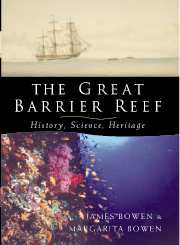Book contents
- Frontmatter
- Contents
- Abbreviations and Acronyms
- Preface
- Acknowledgments
- Introduction: An Overview
- Part One NAVIGATORS AND NATURALISTS IN THE AGE OF SAIL
- Chapter 1 QUEST FOR THE GREAT SOUTH LAND
- Chapter 2 VOYAGE OF THE ENDEAVOUR: COOK AND THE ‘LABYRINTH’
- Chapter 3 ENDEAVOUR NATURALISTS: ‘A SEPARATE CREATION’
- Chapter 4 MATTHEW FLINDERS: VOYAGE OF THE INVESTIGATOR
- Chapter 5 THE REEF EXPLORED: EARLY SURVEYS, 1821–1844
- Chapter 6 EARLY REEF CHARTS COMPLETED: 1846–1862
- Chapter 7 THE REEF AS A MARITIME HIGHWAY: COLONY OF QUEENSLAND, 1859–1900
- Chapter 8 FROM NATURAL HISTORY TO SCIENCE, 1850–1900: VOYAGES OF THE CHALLENGER AND THE CHEVERT
- Chapter 9 EXPLOITATION AND RESOURCE RAIDING: 1860–1890
- Chapter 10 FOR MAXIMUM YIELD: REEF BIOLOGY
- Part Two A NEW ERA IN REEF AWARENESS: FROM EARLY SCIENTIFIC INVESTIGATION TO CONSERVATION AND HERITAGE
- References
- Index
Chapter 4 - MATTHEW FLINDERS: VOYAGE OF THE INVESTIGATOR
from Part One - NAVIGATORS AND NATURALISTS IN THE AGE OF SAIL
Published online by Cambridge University Press: 22 September 2009
- Frontmatter
- Contents
- Abbreviations and Acronyms
- Preface
- Acknowledgments
- Introduction: An Overview
- Part One NAVIGATORS AND NATURALISTS IN THE AGE OF SAIL
- Chapter 1 QUEST FOR THE GREAT SOUTH LAND
- Chapter 2 VOYAGE OF THE ENDEAVOUR: COOK AND THE ‘LABYRINTH’
- Chapter 3 ENDEAVOUR NATURALISTS: ‘A SEPARATE CREATION’
- Chapter 4 MATTHEW FLINDERS: VOYAGE OF THE INVESTIGATOR
- Chapter 5 THE REEF EXPLORED: EARLY SURVEYS, 1821–1844
- Chapter 6 EARLY REEF CHARTS COMPLETED: 1846–1862
- Chapter 7 THE REEF AS A MARITIME HIGHWAY: COLONY OF QUEENSLAND, 1859–1900
- Chapter 8 FROM NATURAL HISTORY TO SCIENCE, 1850–1900: VOYAGES OF THE CHALLENGER AND THE CHEVERT
- Chapter 9 EXPLOITATION AND RESOURCE RAIDING: 1860–1890
- Chapter 10 FOR MAXIMUM YIELD: REEF BIOLOGY
- Part Two A NEW ERA IN REEF AWARENESS: FROM EARLY SCIENTIFIC INVESTIGATION TO CONSERVATION AND HERITAGE
- References
- Index
Summary
On his return from the Endeavour voyage, Banks was the dominant figure in British botany. Well connected to the governing establishment, his London home commanded resources unrivalled in Britain, and equal to many in Europe. In 1778 Banks was elected president of the Royal Society and until his death in 1820 was its autocratic and unquestioned leader, which enabled him to promote natural history as a counterbalance to the previous emphasis on mathematics. Three years after election, in 1781, he was created a baronet with the title Sir Joseph, gaining further stature in society.
The decision to abandon the Florilegium in 1784 must have been a great disappointment to all concerned, although by then Banks was involved in a multitude of activities that took all of his energies. His major preoccupation was directing the Royal Kew Gardens which were playing a major role in the rapidly changing economy of Britain, as the nation became increasingly dependent on its colonies for economic survival in the face of French and Dutch competition. Following the occupation of the New World by Portugal, Spain, and then Holland in the seventeenth century, tropical crops had become essential to the European economy, and intense rivalry ensued.
- Type
- Chapter
- Information
- The Great Barrier ReefHistory, Science, Heritage, pp. 56 - 76Publisher: Cambridge University PressPrint publication year: 2002



